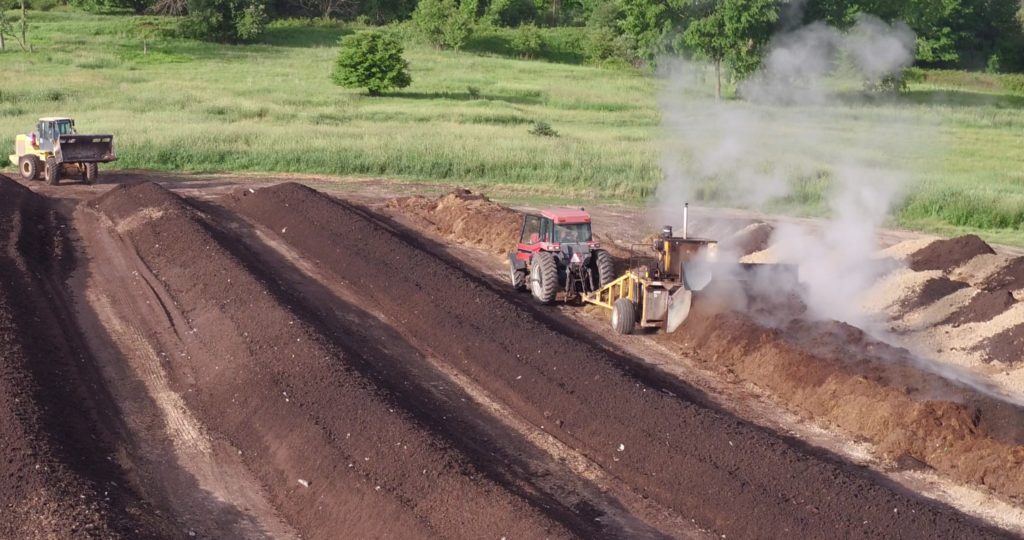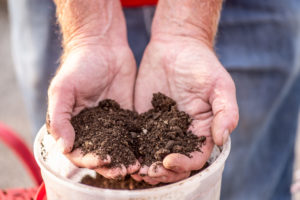
Compost blends: a key to optimizing soil health
{Sponsored} Using compost for increased tuber yields is not a new concept, but in the last decade or so, a renewed interest in learning exactly how it works means that scientists are actively researching the effects of compost on soil health, harmful nematodes, returning biology to the soil and releasing locked-up nutrients to grow the most marketable potatoes possible.
Dr. George Bird, nematologist and professor emeritus at Michigan State University (MSU), still completes research on the impact of compost on soil health. A decade ago, Dr. Bird coordinated a soil health survey of 96 potato fields in Michigan. The Cornell University Soil Health Lab tested samples from each field for chemical, physical and biological factors. After analyzing research, Dr. Bird concluded these sites had outstanding scores for soil chemistries, with little or no room for improvement.
With regards to the physical and biological factors, however, these sites did not score well. Dr. Bird found growers knew how to utilize some compost and commercial fertilizers to net high yields, but had a lack of soil biology across the board as well as issues with compaction and other physical problems.
Since, Dr. Bird has made it his mission to educate growers on how they can improve on the areas where their fields showed problems, such as by utilizing higher quality compost and expanding their use of compost. While researchers are still figuring out exactly how much compost growers should use and the soil health benefits, Dr. Bird is sure that growers know that by using compost, they are growing a better product. “If any farmer that you work with starts changing what they do, and after doing it several times if they continue doing it, that is the bottom line, the answer is it is working,” Dr. Bird said.
Dr. Bird also believes the growers are using compost as something called a “pulsing agent” which can awaken biology in the soil — sort of like water hitting a dormant bacterium. The nitrogen that lives in soil is primarily tied up in living and dead organic matter, inaccessible to tubers. The microorganisms in compost also will consume that organic matter and excrete the nitrogen in a form that plant roots can absorb, meaning compost can help unlock inaccessible nutrients for potato plant development and tuber yield.

Harmful nematodes are another area where compost has been shown in research studies to be a boon to potatoes. Dr. Marisol Quintanilla, research nematologist and assistant professor at MSU, recently proved that 100% compost will kill all harmful nematodes. The next step that Dr. Quintanilla is working on is figuring out what is the optimal amount of compost to use, considering costs and benefits, since 100% compost would also reduce tuber yield.
Dr. Quintanilla tested the rates of composted manure that most growers use — about 1.5 to 2 tons per acre — and concluded this rate would provide significant control of harmful nematodes, reducing the population. Future testing will check other rates to ensure that the results of the study will provide the best rates for growers to use. In field tests, the same plots also showed a “significant difference in vascular discoloration that happens when verticillium goes into the plant,” Dr. Quintanilla said.
Dr. Bird and Dr. Quintanilla complete tests with a variety of compost blends from Morgan Composting, to see which type of compost is best for potatoes and to help Morgan Composting craft better customized compost for potatoes and other crops. “I am a real believer in compost technology, because compost technology helps soil chemistry, makes soil physics better, and it also enhances the biology that is necessary to make the soil work,” Dr. Bird said. “The beauty of the Morgan Composting company is that if you know what compost you need, what the properties are, Morgan Composting will make you a designer compost to fill that bill,” he continued.
Ultimately, the goals of this research and of Morgan Composting’s efforts to customize compost for each grower’s needs are to promote sustainability and cumulative effects.
Brad Morgan started Morgan Composting after seeing the waste that his former dairy farm produced. In the 1990s, Morgan began to sell composted manure, known as DAIRY DOO, to growers to solve soil health issues that the industry was facing.
Morgan Composting believes that using the right compost blend combination for each field offers cumulative effects for growers, helping reduce the chemical impact agriculture has on our environment, managing waste problems, reducing compaction and helping to overall increase sustainability.
“I think the longer-term success is from sustainability, actually reducing the use of other chemicals and pesticides. Where Morgan Composting fits in is the predictability aspect. We do a lot more testing and have invested into more research and product development than any other company that I am aware of. I believe I can have an influence on changing the biological performance of soil,” Morgan said.
To learn more about the customized compost blends created specifically for potatoes by Morgan Composting, visit dairydoo.com.
© 2021 Morgan Composting














